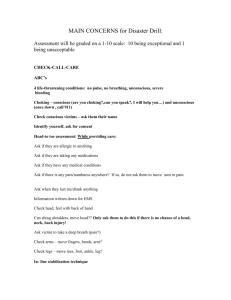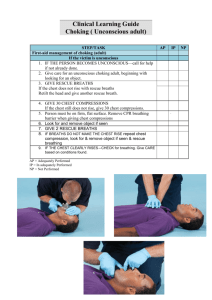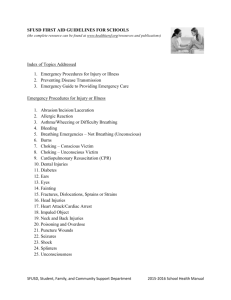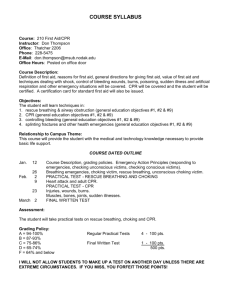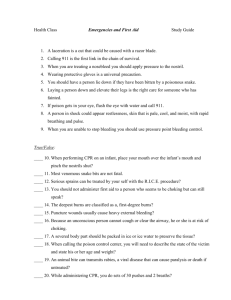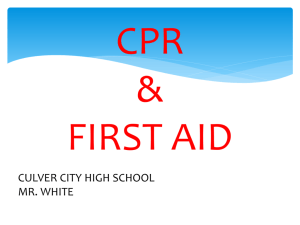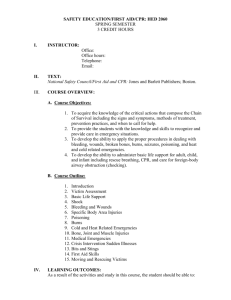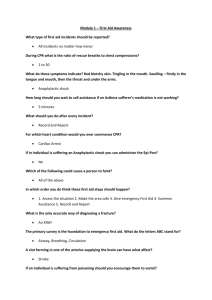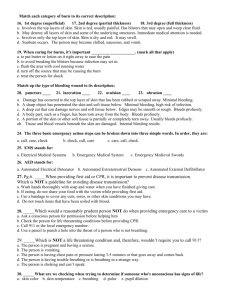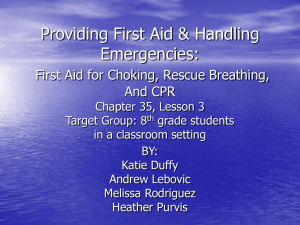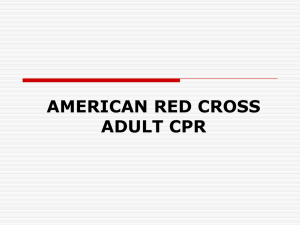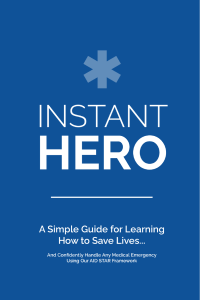Unconscious Choking
advertisement
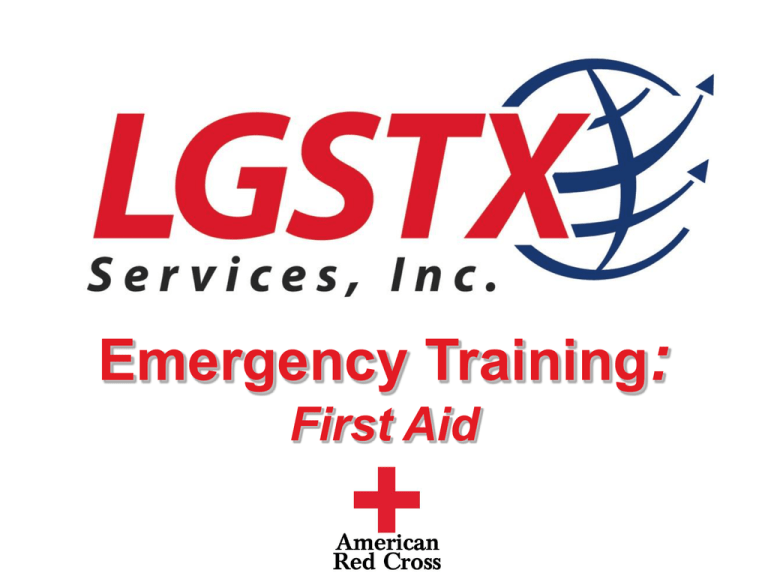
Emergency Training: First Aid Overview • • • • • • • • Checking an Ill or Injured Adult CPR Unconscious Choking Conscious Choking External Bleeding Burns Poisoning Head, Neck or Spinal Injury 2 Checking an Ill or Injured Adult 1. Check for responsiveness by tapping on the shoulder and asking, “Are you ok?” 2. If no response call 911. 3. Open the airway by tilting the head and lifting the chin. 4. Check for breathing for no more than 10 seconds, occasional gasps is not breathing. 5. Quickly scan for bleeding. 6. If not breathing, proceed with CPR or use Automatic External Defibrillator (AED) if available. 7. If breathing, maintain open airway and monitor for change in3 condition. CPR 1. Give 30 chest compression – Push hard, push fast in the middle of the chest at least two inches deep. 2. Give two rescue breaths – Tilt the head back and lift the chin. – Pinch the nose and give a breath for one second for the chest to clearly rise. 3. Do not stop – Continue CPR until you are unable or medical personnel have arrived. 4. If breaths do not make chest rise even after retilting head, go to unconscious choking. 4 Unconscious Choking 1. Give rescue breaths. 2. Give 30 chest compressions. 3. Look for and remove object if seen. 4. Give two rescue breaths. 5. If breaths do not make chest rise, repeat steps 2-4. 5 Conscious Choking 1. Give 5 back blows – Bend person over at the waist and use heel of hand to hit between shoulder blades. 2. Give 5 abdominal thrusts – Place hands in middle of abdomen with thumb against their body above their belly button, with other hand covering your fist and give upward thrusts. 3. Continue care. 4. If person becomes unconscious call 911 and go to unconscious choking care. 6 External Bleeding 1. 2. 3. 4. 5. Cover the wound with sterile dressing Apply direct pressure until bleeding stops Cover the dressing with a bandage Apply more pressure and call 911 If bleeding does not stop, apply more dressing and pressure. Also take steps to minimize shock by laying person down, elevating feet, and do not raise the person’s head. Shock symptoms include pale skin, weakness, rapid pulse, and increased rate or irregular breathing. 7 Burns 1. Remove from source of burn. 2. Cool the burn under running water until pain is relieved. 3. Cover loosely with sterile dressing. 4. Call 911. 5. Care for shock. 8 Poisoning 1. Be aware of the scene and the injured so that you can identify the cause of poisoning. 2. If person is unconscious, not breathing, or has change in consciousness call 911. 3. If person is conscious, call the National Poison Control Center at 1-800-222-1222 and follow advice given. 9 Head, Neck and Spinal Injuries 1. Call 911. 2. Minimize movement of head, neck, and spine. 3. Stabilize head to keep it in position it was found in by placing hands on either side of the head. 10 Stroke • Think F.A.S.T – Face: Ask the person to smile, does their face drop? – Arm: Ask the person to lift their arms. Does one drift down? – Speech: Ask the person to repeat a simple sentence. Is their speech slurred and can they repeat it correctly? – Time: Call 911 immediately if you see any signs of stroke and take note of when the signals were apparent to tell EMS. 11 Questions, Concerns, Assistance For Questions, Concerns, and Assistance please contact Human Resources: Steve Sager Director of Human Resources, Airborne Global Solutions Phone: 937-366-2830 Email: steve.sager@airborneglobal.com References "Adult First Aid/CPR/AED Ready Reference." American Red Cross. The American National Red Cross, 2011. Web. 26 Jul 2012. <http://editiondigital.net/publication/?i=63248>. 12
